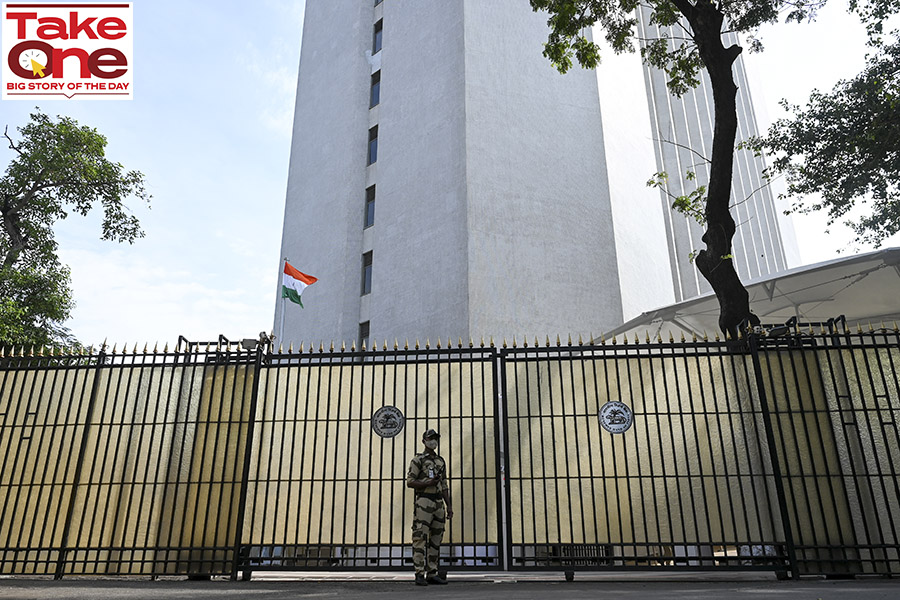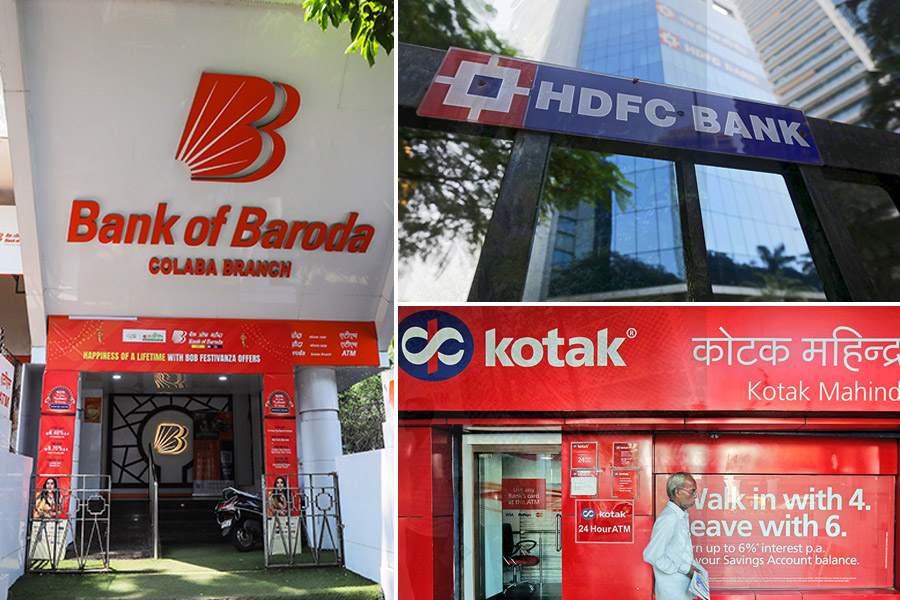
Post RBI's action against Kotak, lenders could become more cautious: Analysts
The regulator's action against the digitally focussed bank will see its quarterly earnings growth getting impacted. The RBI needs to have a deeper engagement with banks before cracking the whip. Banks, on the other hand, need to scrutinise their internal security and technology mechanisms more closely instead of just chasing growth
 In March this year, the RBI asked Federal Bank and South Indian Bank to stop issuing new co-branded credit cards, in an effort to improve regulatory scrutiny.
Image: Punit Paranjpe / AFP
In March this year, the RBI asked Federal Bank and South Indian Bank to stop issuing new co-branded credit cards, in an effort to improve regulatory scrutiny.
Image: Punit Paranjpe / AFP
The Reserve Bank of India’s (RBI) regulatory action against one of the largest private lenders, Kotak Mahindra Bank (KMB), on Wednesday will have repercussions for the bank—now under the new CEO Ashok Vaswani—raising concerns over in its future growth path if the restrictions are not lifted soon. It also raises deeper concerns for all banks in the country, signalling that no one will be spared and that introspection, rather than balance sheet growth, needs to find priority for managements.
The bank will have to cease and desist, with immediate effect, from onboarding new customers through its online and mobile banking channels and issuing fresh credit cards. KMB can, however, service its existing customers, including those for credit cards.
The RBI took this action based on concerns arising from its “IT examination of the bank for the years 2022 and 2023 and the continued failure on part of the bank to address these concerns in a comprehensive and timely manner”, the central bank said in a statement posted on its website.
“Serious deficiencies and non-compliances were observed in the areas of IT inventory management, patch and change management, user access management, vendor risk management, data security and data leak prevention strategy, business continuity and disaster recovery rigour and drill,” the RBI note said.
In the absence of a robust IT infrastructure and IT Risk Management framework, the bank’s core banking system (CBS) and its online and digital banking channels have suffered frequent and significant outages in the last two years, the recent one being a service disruption on April 15, resulting in serious customer inconveniences, the RBI said.
In response, KMB says: “We have taken measures for adoption of new technologies to strengthen the IT systems and will continue to work with RBI to swiftly resolve balance issues at the earliest.” It will continue to onboard new customers only through its branches, till further notice from the RBI.
Vaswani has written an email to bank employees allaying their fears, saying that the bank is in the process of building a completely different level of technology infrastructure.
 These RBI actions point to a proactive regulator which wants banks to be at the forefront of digital lending and data security, as the economy grows larger.
Image: BoB: Niharika Kulkarni/NurPhoto via Getty Images; HDFC Bank: Reuters/Shailesh Andrade/File Photo; KMB: REUTERS/Adnan Abidi/File Photo
These RBI actions point to a proactive regulator which wants banks to be at the forefront of digital lending and data security, as the economy grows larger.
Image: BoB: Niharika Kulkarni/NurPhoto via Getty Images; HDFC Bank: Reuters/Shailesh Andrade/File Photo; KMB: REUTERS/Adnan Abidi/File PhotoIs RBI ignoring reality?
The rap on the knuckles for KMB is similar to what India’s largest private sector lender, HDFC Bank, got in December 2020. At that time, the RBI told HDFC Bank to stop all launches of its upcoming digital business-generating activities and sourcing of new credit card customers. This action was taken after the bank had seen repeated outages in data. The RBI then lifted all these restrictions by March 2022.In March this year, the RBI asked Federal Bank and South Indian Bank to stop issuing new co-branded credit cards, in an effort to improve regulatory scrutiny.
Earlier in January, Paytm Payments Bank (PPBL) was barred from accepting fresh deposits and doing credit transactions after February 29. PPBL has seen a drop in its business transactions since.
Last October, the RBI asked Bank of Baroda to suspend on-boarding customers onto the ‘BoB World’ mobile application due to material supervisory concerns in the onboarding process.
Also read: Uday Kotak: Going Beyond The Bank To Shape India's Financial Sector
These actions point to a proactive regulator which wants banks to be at the forefront of digital lending and data security, as the economy grows larger. But while technology has become first class, the working culture and talent pool for lenders has not improved dramatically.These actions point to a proactive regulator which wants banks to be at the forefront of digital lending and data security, as the economy grows larger. But while technology has become first class, the working culture and talent pool for lenders has not improved dramatically.
“India has first world regulation and third world revenues. The regulator is choosing to ignore reality. They need to have a different stand for different banks,” says a former RBI executive. “The RBI needs to have a deeper engagement with banks, understand their business roadmap before taking action. This has led to a widening gap between real time technology and increased core banking activity,” the executive says.
It has also been seen that the RBI has rarely taken regulatory action against public sector banks, barring Bank of Baroda.
An official with a multinational consultancy firm said the regulatory action against KMB tends to point that banks in India need to spend more time towards managing their internal security and technology systems, rather than “chasing growth”.
In KMB’s case, its digital lending journey escalated with Kotak811 in 2017—which grew out of the government’s move for demonetisation. “Its digital growth grew fast post that, but the bank has probably not paid too much attention to its investments towards technology,” he said.
Kotak811 was instrumental in the bank onboarding new customers fast, and it now has 17 million savings accounts, where customers can open a zero-balance digital savings account through video-KYC.
Also read: The RBI is doing the right stuff: Oliver Prill
Kotak’s earnings growth estimates trimmed
KMB has faced some concerns in recent times. There were concerns surrounding the succession plan after its founder Uday Kotak decided to step down from the bank ahead of time on September 1, 2023. It forced the regulator to finalise the successor [Vaswani] quicker. The KMB stock has fallen over 17 percent in the last three years.Jefferies analysts Prakhar Sharma and Vinayak Agarwal in a note to its clients on Thursday said it has trimmed the earnings and price target for Kotak Mahindra Bank, while maintaining a hold rating.
“Credit cards (and unsecured loans) has been among the fastest growing segments for Kotak Mahindra Bank with +20 percent year-on-year growth in customers and +50 percent growth in values; both higher than the sector. Hence, moderation of business here can impact revenue/costs. We trim earnings by 1-2 percent for FY25 to factor in potential risks and lower valuations for our price target. We also watch for smoother succession and HR trends,” the report said.
The analysts also said the action against KMB could “make lenders cautious and hasten any corrections that RBI may have asked for. It may affect loan growth as banks will take comments on LDR (loan-to-deposit ratio) more seriously”.
The restrictions imposed by the RBI will be reviewed upon completion of external audit and corrective action plan to RBI’s satisfaction which typically takes six to 12 months.
Emkay Global analysts Anand Dama, Kunaal N and Marazbaan Dastur said in a report on Thursday that “such restrictions should impact business growth, including KMB’s already dwindling CASA ratio (down 13 percent from its peak to 48 percent) and its new card acquisition (CIF growth @21 percent YoY/spends@34 percent YoY)”.
It would lead to its earnings being hit in the medium term. “Additionally, the regulatory overhang would delay any hope of a re-rating post the recent management change,” the Emkay team said. Emkay has lowered its rating for KMB to ‘Reduce’ from “Add’ and cut its March 25E target price to Rs1,750 per share (from Rs1,950), valuing the standalone bank at 2.1x FY26E ABV (earlier 2.5x) and subsidiaries at Rs 490/share.
Analysts and experts Forbes India spoke with are confident that KMB will be able to ride out of this situation.
For Vaswani—as with HDFC Bank’s CEO Sashidhar Jagdishan—this will be a test of leadership, after taking charge from high profile leaders. HDFC Bank took nearly 15 months to ride out of its regulatory hurdles. The same will apply for KMB… the longer the regulatory restrictions, the longer the overhang. It will also mean that its rivals, particularly Axis Bank, would be able to take advantage of the situation.


















